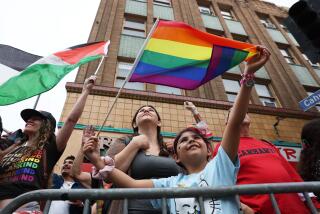Opinion: LGBT Americans have always lived under the threat of violence. Will Orlando force straight people to acknowledge it?
- Share via
Three years ago, Mark Carson was walking with a friend in Greenwich Village, the Manhattan neighborhood that birthed the contemporary LGBT movement. It was a Friday night in early spring; they wore cut-off shorts and cowboy boots. When they turned a corner onto West 8th Street, a group of men appeared behind them.
“What are you, gay wrestlers?” one taunted. “F----t!” another yelled. “Queer.” Finally, one asked the question Carson would never get to answer: “Do you want to die here?” He shot Carson in the face with a .38-caliber revolver. Carson, who died from his injuries, was the fifth openly gay man to be violently attacked in Manhattan in a span of just three weeks. In court, his killer, Elliot Morales, claimed to have acted in self-defense. The defense characterized Morales as “self-loathing,” highlighting his fraught romantic relationship with a transgender woman.
A year later, Ali Muhammad Brown used the gay and bisexual dating app Grindr to lure two men to meet him outside of R Place, a popular gay bar in Seattle. Less than 17 minutes after picking them up, he had killed both execution-style in his car. Brown said his mission was “vengeance” for the U.S. killings in Iraq, Syria, and Afghanistan. He described himself as a jihadi.
In the wake of the horrific attack on the Pulse club in Orlando, Fla., the motivations of gunman Omar Mateen will be dissected ad nauseum. The information we have right now points to an increasingly complex case, with myriad potential social and political motivations. International terrorism, however, is on the lips of politicians and pundits after it was revealed that Mateen pledged his fealty to ISIS. Whatever the particularities of this case, however, the reality is that the threat and realization of violence against the LGBT community are not isolated to a lone Florida club. The scope of the Orlando attack was shocking, but acts of violence against the LGBT community are disturbingly common.
The victims went to Pulse nightclub to be themselves in a safe corner of a hateful world, and the price they paid was their life.
The year 2015 was the most lethal on record for transgender people in America, with a 40% increase in fatalities from 2014. “My grandmother is 90 and I have more dead friends than she does,” a 46-year-old transgender woman told Ebony. “Killing us is nothing new. It’s like being a policeman. When you go to work, you know you might get shot. It’s just something that comes with the territory.” Trans women also experience sexual violence at nearly twice the national rate.
LGBT youth are frequently bullied, sometimes to death. Perhaps the most notorious case in recent years was that of Tyler Clementi, the Rutgers freshman who killed himself after his roommate surreptitiously recorded him kissing another man. Clementi is far from alone in his suffering. In a 2015 study, LGBT students were found to be 91% more likely to be bullied and 46% more likely to be victimized than their peers. Activist and author Dan Savage created the “It Gets Better” campaign to bring hope to queer youth who are struggling under constant harassment. Its videos have been viewed more than 50 million times.
Gay, lesbian, and bisexual Americans are still the frequent subjects of systemic violence. Two years ago, James Cosby killed both his daughter and her girlfriend in Houston; he’d mentioned to his family that he disliked her sexual orientation. In Cosby’s bedroom, the Koran had been left open to a page that described homosexuality as a sin. Last month, Nick Hawkins was shot dead on his way home from a beauty pageant; a group of young men has since been charged in the crime. While Hawkins was proud of his bisexuality, he’d already had to drop out of high school due to constant harassment.
The Orlando attack gave many straight people a glimpse into what LGBT Americans have known all along: that the world is dangerous if you’re queer, more dangerous if you’re also an ethnic or racial or religious minority. The victims went to Pulse nightclub to be themselves in what they thought was a safe corner of a hateful world. The price they paid was their lives. The Orlando attack chillingly underscores that, for LGBT Americans, there are no safe corners.
Saturday night was “Latin night” at Pulse. The music was a mix of reggaeton, bachata, merengue and salsa. Ray Rivera, a straight man, DJ’d. Trans talent performed. There are so many other countries where that night couldn’t have happened. In the wake of the attacks, conservative politicians have referenced the need to adhere to our founding documents, so let’s meet them there. “Life, liberty, and the pursuit of happiness” are the inalienable rights given to all Americans. Those are the rights our government was created to protect. The Orlando victims were part of a community that deserves the full promise of our country. They were part of a community that deserves better than what we have given them.
ALSO
How the Orlando attack could mark a shift for gay Muslims
Editorial: Trump isn’t the only Republican to play word games with terrorism
Op-Ed: Is the God of Jews, Christians and Muslims a homophobe?
More to Read
A cure for the common opinion
Get thought-provoking perspectives with our weekly newsletter.
You may occasionally receive promotional content from the Los Angeles Times.











